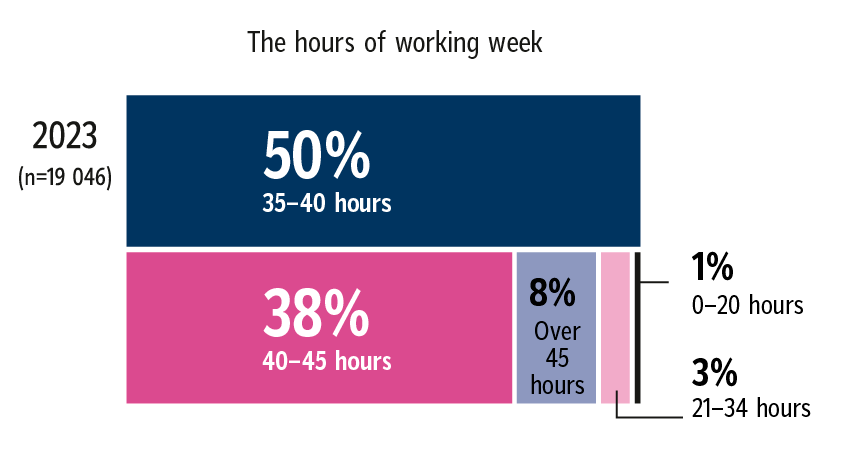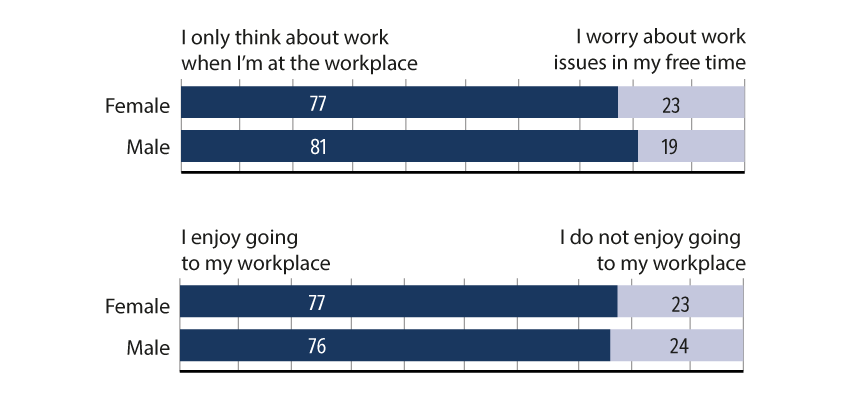Perusduunari muiden joukossa –
3. Employees are pushed to the limit
A majority (76%) of respondents in the member survey reported that they enjoy going to work. This is indicative of the meaningfulness of work, a comfortable work environment and work motivation, which is improved by various positive factors related to work. When employees are motivated and inspired, the results are better.
Work motivation also affects the employee’s well-being at work and their performance and coping. Effective management and division of duties and a pleasant work community contribute to employees’ motivation. In the survey, men felt that their work is more meaningful compared to women.
Good work-life balance helps with coping at work. In addition to sufficient free time, it matters how well work-related matters can be left to the workplace. A good work-life balance requires that work matters are not always on one’s mind outside work.
One in four female members are troubled by work matters in their free time. Among men, the percentage was lower. Whether the work is daytime or shift work also makes a difference. Shift workers are able to leave work-related matters at the workplace clearly more often than daytime workers.
The How is Finland doing? (2023) study by the Finnish Institute of Occupational Health reports that well-being at work has clearly deteriorated since 2020. According to the study, the ability to work a part of hours remotely is the most effective way to support well-being at work. Only a small percentage (5%) of Industrial Union members have the opportunity to work remotely. Signs of fatigue at work can be seen in the member survey’s responses. The reasons for fatigue include the number of hours worked, unpleasant work tasks and the type of working time, whether daytime or shift work.
– I don’t have the time to get much enjoyment from life. With work and small children taking up time, I feel I’m not able to live my own life. I have no choice but to get by, says one middle-aged man working in the metal industry.
In the member survey, family, friends and coworkers were brought up as the most important sources of support for coping at work. Many say they have found a partner with whom daily routines are easier to manage. For many, what makes the day-to-day easier is a realisation of what is truly important in life.
– My life is amazing thanks to my wife and children. After realising that work is not the most important thing in life, I stopped feeling stressed and everything became easier, says one middle-aged metalworker.
– Having children around improves my mood. In other words, things are better every other week, says another middle-aged metal industry worker.

Long workweeks have become more common
Industrial Union members are working longer weeks. This is the first significant change from the previous member survey. In addition to seeking better purchasing power, the trend of working longer weeks is driven by employers’ desire to squeeze more out of employees. All extra work increases the number of hours worked and eats into the time employees can spend on themselves and their families.
In the survey, members were asked to add up their hours worked during a typical workweek, including the main and secondary occupations and possible overtime. The change from three years ago is substantial. The percentage of those who work more than 40 hours a week has doubled from the member survey conducted in 2020.
Among those working long weeks, nearly one in ten (8%) work over 45 hours a week. According to the member survey, an increasing percentage union members say they could work more hours than currently (61%). In particular, the majority of respondents under the age of 36 (70%) say that they could work more hours.
Employees have less autonomy than before
Another key observation of the member survey is that the autonomy of the typical industrial worker has decreased in three years. As one middle-aged male member working in the chemicals industry notes, employees are being squeezed harder than before. Autonomy of work means the things that employees can influence in their own work. As many as one in six (17%) of the survey’s respondents feel that they have no influence over any aspect of their work.
Areas of work that respondents felt they could influence most commonly were the organisation of work tasks and the pace of work, with about half of the respondents feeling this way. About a third feel that they can influence their working hours, work assignments and division of duties. One in five are able to influence with whom they work.
Age appears to have less of an impact on employees’ ability to influence their work. Only respondents over 55 were more likely than others to report that they cannot influence how duties are divided or whom they work with.

